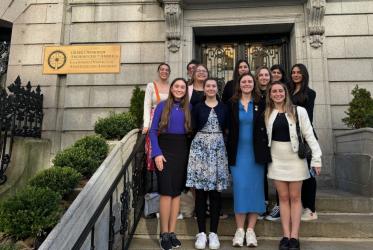Ending racism both in the USA and worldwide will require reexamining history - or even learning it for the first time - taking stock of the present, and changing our laws and ultimately our behavior, said Lisa Sharon Harper, founder and president of Freedom Road, a consulting group that helps communities strengthen their capacity to build a just world.
Harper was part of a group of clergy, academics and journalists who worked together during a “Day of Action and Advocacy” on 5 April in Washington, D.C.
The day was part of the A.C.T. to End Racism initiative organized by the National Council of the Churches of Christ in the USA and its partners, including the World Council of Churches.
“Race” is a political construct, reflected Harper. “Race is not in the Bible. In the Bible you see the word ‘ethos,’ meaning origin, not race.”
If we travel back in time to 380 BCE, the Greek philosopher Plato, in his Socratic dialogue “The Republic,” mentions race in his text related to the order and character of a just city-state.
“Plato compares race to different metals that people are made of,” said Harper. “Some are made of gold, some copper, some iron. Race wasn’t hierarchical necessarily then.”
But gradually the concept of race was created to determine how different groups of people would serve the general public.
Who is fully human?
Moving rapidly up to the 1450s, Harper points out, “You have significant involvement from churches in racial hierarchy.” Romanus Pontifex, Latin for ‘The Roman Pontiff’, a papal bull written in 1454 by Pope Nicholas V to King Afonso V of Portugal, is rooted in historic efforts by Christian monarchies and states of Europe in the fifteenth and later centuries to assume and exert rights of conquest and dominance over non-Christian indigenous peoples.
In other words, Harper said, “When you came across people or land that wasn’t paved over with stone, then you could claim it and you could enslave the people.”
Fast-forwarding to the 18th century, Harper noted that the Swedish scientist Carl Linnaeus published a system for classifying living things, into kingdoms, classes, orders, and species. “He had this brilliant idea,” said Harper. “If this works with fauna, maybe it works with humanity as well.”
In fact, Linnaeus is widely regarded as developing the first formulation in modern science of what would soon become the "race" concept: Europaeus albus, or “white Europeans”; Americanus rubescens or “red Americans/native Americans”; Asiaticus fuscus, or “yellow Asians”; and Africanus niger, or “black Africans.”
Ultimately, these classifications would become politicized and used by people and groups who wanted to specify "others" in comparison to the dominant group, the white Europeans.
Forty-one years later, we see the ramifications of such classifications reach a point at which people are regarded as sub-human: the Three-Fifths Compromise, drawn between state delegates during the 1787 United States Constitutional Convention. As policymakers debated how slaves would be counted when determining a state's total population for legislative representation and taxing purposes, the compromise solution was to count three out of every five slaves as a person.
“They decided they would count people of African descent as 3/5 of a person,” said Harper. “This says they believe slaves are not fully human.”
The core spiritual lie
Three years later, in the 1790 census of the USA, there is only one race: white. “What does this say to people?” asked Harper. “It says to white people that ‘all race revolves around you, and you are the centre of this construct that we have created called race.'”
In every USA census since 1790, the categories of race have changed - except for white, she noted. “There is no Irish-American or Swedish-American,” she said. “There is only white. Why? Because race is a political construct to determine how the polis will live together.”
Collectively, decisions were made to construct the concept of race so that, legislatively, economically and socially, and whiteness is what ruled in America. “In the same year, 1790, the Naturalization Act declares only free white people of good character could become citizens. Why is naturalization important? It gives the right to exercise dominion, to dream, to shape the land, to order society - and it was only open to free white men of good character. Their property included their women and children.”
In essence, legislation at that time decreed that only white people were fully human, and that, she added, is “the core spiritual lie that shapes everything. That’s the core spiritual lie we’ve been fighting for centuries, even though in Genesis we are told that all humanity is made in the image of God.”
In studies gauging people’s reactions, 75 percent of people in the world are biased toward whiteness, said Harper, “and why wouldn’t they be? They’ve been soaking in a political construction that produces systemic and structural outcomes that are shaped by explicit and implicit bias against people of color.”
Harper continued with examples of explicit and implicit bias. “Explicit bias is lynching. Implicit bias, today, includes the death penalty. Explicit bias is openly referring to Mexican people as rapists and drug dealers, and building a wall. Implicit bias is the framing of border security. Explicit bias was the Jim Crow laws that segregated schools. Implicit bias was the legislation, in 2007, that determined de facto segregation of schools is okay.”
Dismantling the lie of race requires delving into history, examining how we are still living the lie, and ultimately changing both the laws and people’s behavior, said Harper.
“What do we do now? We live the truth and we legislate the truth. We are given the capacity to exercise stewardship for the world. Now is the time to use that capacity.”
Learn more about the “Act Now to End Racism” event and initiative
"Dear white Christians: what now?" (WCC news release 5 April 2018)
Read WCC moderator Dr Agnes Abuom’s remarks to the ecumenical gathering
Read a first-person account of the 1968 WCC assembly and the Programme to Combat Racism






